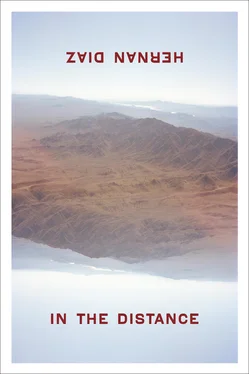Lorimer led his party farther into the glaring expanse. Just as James Brennan would stop at every turn to pick up a pebble or pan some dust in search of gold, Lorimer constantly paused to gather up crumbs of salt, inspect them carefully, and finally toss them away, growing more somber with each discarded sample. He dismounted so often that eventually he decided to walk, and he kneeled down so frequently that in the end he just proceeded on all fours. His men, still on their horses, looked at him, disconcerted. There was no talking. Even though they did not stop to rest at any point, by the time they camped for the night they had not advanced more than six miles, according to their disgruntled tracker’s estimation. Lorimer, sullen after his unsuccessful first day at the salt lake, refused dinner and went to work in the wagon. Later that night, the men huddled around the small fire (wood had become a major concern) while the naturalist remained in the outskirts of the circle of light, a solitary bulk. Håkan could not quite follow the words whispered over the tin mugs, but their bitterness was plain. As the fire died out, it was agreed that posting a lookout was an unnecessary precaution in that wasteland.
The following few days were no different. The men advanced at a snail’s pace through the salt flats, walking ahead of Lorimer, who, magnifying glass in hand, squatted over every flake and crawled across miles of salt looking for traces of his primeval being. The sky was as hard and deserted as the land. The men were wrapped in fabric, leaving only a slit open for the eyes—sometimes, exhausted by the whiteness, they even covered this opening and, knowing there were no obstacles for miles around, followed the blurred ghosts of their companions, still visible through the threads. They barely spoke. The alkali dust hardened and cracked their lips and made their noses bleed. Most of their food (biscuits, charqui) was salted, which gave Håkan the impression that he was being devoured by the desert with each bite he took. They were running out of water.
One morning, before dawn, they woke up and found that Lorimer was gone. They looked around in the twilight, using their hands as visors, as if somehow that would help them penetrate the shadows. Someone tripped on a rope tautly stretched toward the horizon. They walked along it. A few hundred feet later they found Lorimer crouching at the end of the rope and following with his eyes the straight line it traced over the salt. Ignoring them, he walked up and down, holding a half-full jar with some markings, stopping here and there and placing it horizontally on the rope while studying its contents. In the end, he looked up, smiling for the first time in days, and told everyone to get ready to ride at the swiftest pace possible while still sparing the horses. They were going farther into the salt field. After a moment of silence, the tracker spoke up. No one was sure how wide Saladillo was, he said, and there was no guarantee they could traverse it before exhausting their provisions and animals. They had to go back at once, since they had almost reached the point of no return. Following the tracker’s speech, the rest of the men, usually shy and respectful of Lorimer’s authority, started voicing their concerns and threatened to turn around and abandon their employer. In a stern voice Håkan had never heard him use before, Lorimer reminded his men of their obligations, which they would have to fulfill to be paid in full. He also told them they would not get far without the supplies in the wagon, which they would have to steal from him, together with horses and burros. The penalty for this offense, as they knew, was death by hanging. There was a pause. Then, more calmly, he asked for their trust and assured them he was not leading them to their death. He knew how to obtain enough water to cross Saladillo. Moments later, the resentful party set out.
Lorimer rode next to Håkan and confided to him, in their private jargon, that his approach to the expedition had been mistaken all along. Under such harsh conditions, with his limited scientific equipment, it would be impossible to find the minuscule shards of evidence he was looking for. Remainders of tissue in a salt desert blasted by the sun? Impossible. Water. He needed water. Vestiges of the primitive life form could only have been preserved in a liquid environment.
“Have you noticed we have been walking downhill?” he asked.
Håkan stirred in his saddle and looked around, confused, at the white barrens.
“It is a slight decline, of course. But it’s there,” Lorimer said. “I suspected we were on a tenuous slope and confirmed it this morning with that rope I was toying with when you found me. I tied it to a stick one foot above ground and walked away, holding it taut. About seventy paces away, I tied the rope to a second, slightly longer stick. I confirmed the rope was straight with the makeshift level I made with that jar. And wouldn’t you believe it, here the rope is about three inches higher. The descent is hardly noticeable in this void, but it’s there. And I’m sure that the incline indicates that this is a basin. I am convinced that if we keep walking downhill, we will reach the deepest point of this seabed and find water in the clogged drain in the middle of this white desert.”
They pushed on. The uninterrupted beehive pattern on the salt made the plain even more oppressive. Despite its terrors, a uniform expanse could be calming. Håkan knew this well—he had often forgotten himself and become nothing with the void around him, and those oblivious moments were the only mercy the desert had shown him. But there was something asphyxiating about those regular cells. It was impossible not to count them, not to look for patterns within patterns, not to compare the thickness of the lines, not to look for the largest or the smallest cell in sight, not to search for the most regular shape, not to guess how long it would take to reach a certain cell, not to calculate how many cells there were to the horizon. All those lines and the numbing games they forced the mind to play were perverse reminders of the vastness they were challenging. How calming Håkan found the endless night sky after those long, gridded days! The firmament was certainly greater than the desert, but at least it did not tease him with lines and cells that brought the unfulfilled promise of an ending. Night also offered a respite from the inflexible whiteness, which was the color of their thirst—and thirst was everything. After a violent incident, their water supply had to be guarded with guns at all times. As they traveled on, even if the heat was as intense as ever, Håkan found that nobody sweated any longer. His urine was orange and its discharge painful. Two men suffered from hallucinations. Håkan now understood the human body well enough to know that they would die in a matter of days.
The dot on the horizon was not a hallucination because they could all see it. One of the tracker’s men gave hoarse cries. Another one laughed. The dot became a wagon. No animals. The wagon became a wreck. Surrounding the whitened remains of the wagon, the bleached bones of oxen. In the bed of the wagon, the skeletons of three children and their parents. One of the men started to cry. He bawled and twisted his face into a grimace of grief, but no tears came out. He grabbed an ox’s tibia and tried to club Lorimer with it. Håkan was the only one to step in and stop him. The rest of the men had a murderous look about them but were too exhausted to attempt a coordinated mutiny. Once he had recovered from the shock of the failed attack, Lorimer started dismantling the old cart. In a barely audible murmur, he told his men to help him get as many planks as they could. Nobody moved.
“You want water? Get planks!” Lorimer roared.
Читать дальше












